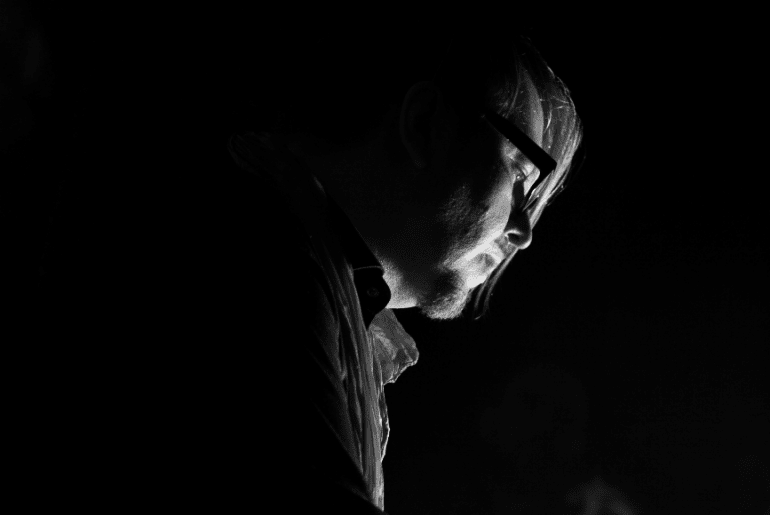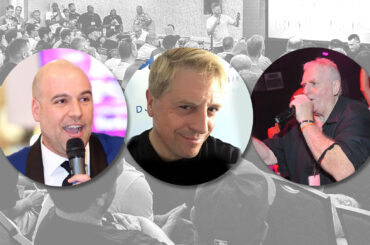The career of Polish DJ/producer and mastering engineer Robert Babicz spans three decades, genre-hopping from techno to acid house and minimal under an umbrella of successful pseudonyms including Rob Acid, Acid Warrior and Sontec.
After emerging at the peak of the early ’90s acid-house scene, Babicz, by the end of the decade, demonstrated his versatility with the ambient album, Desert, on the renowned label, Milles Plateaux. Fast forward decades later and he has an astonishing 1,000 releases to his name for a multitude of high-profile labels, including his own Babiczstyle and, more recently, DIRTCUTS.
An improviser with no musical schooling, Babicz utilizes the gift of synaesthesia to create his geometrically crafted studio productions – like Utopia, his wonderfully eclectic new album. And during the pandemic lockdown, he began live-streaming from his studio “spaceship” in typically improvisational fashion, while his Mastermind online mentoring platform kept him plenty busy. We recently caught up with the Malta-based DJ/producer.
DJ Times: How did you react to the pandemic?
Babicz: When everything closed, our income stream was gone. For a few weeks, I was in a state of depression; then I decided to face the situation and work out what I could do. There are artists who have given up because it’s all been too difficult for them. But others will see it as an opportunity. I see it as a chance – as if somebody had pushed the reset button and we can start again.
DJ Times: You were one of the first DJ/artists to do live-streaming from home, right?
Babicz: I saw a few DJs playing from home and quite a lot of my fans asked me if I could give them a little bit of Babicz flavor. Putting up a camera and having fun alone was a bit strange at first, but then the music took me away, and I forgot it was there. For the first couple of streams, I set up a table and danced around the room, but by the third, I was sitting in my spaceship and just playing to see what happens. Then I had a moment when I started to cry. I thought to myself, “What is going on in this world? I’m sitting here, the music is taking me away and I’m sharing it.” That was very emotional.
DJ Times: What’s your live-stream set-up?
Babicz: It’s super-simple. I bought a GoPro camera from Amazon and a webcam – although I recently upgraded to a Sony ZV-1 camera to give me a little more quality. That’s going into my soundcard and I’m using free OBS streaming software. Otherwise, I’m basically using what’s around me in the studio. In terms of music-making, I’ve found this situation liberating because this crisis is forcing artists to rely on their own feelings. Because I no longer have this feedback from the outside world, I’ve started to experiment more. I don’t have to be bound to the dancefloor because there is no dancefloor.
DJ Times: During lockdown you concluded your Dirtcuts EP. Have you been able to produce tracks quicker throughout this period?
Babicz: I’ve been making music for 30 years and 90-percent of what I do is made in one day. I start in the morning and, by 6 to 8 p.m., a track will be fully produced and mastered. I love to work fast because you can really tap into the emotion that’s driving the music. A track is never really ready – you can always try to change elements to make it better. But at some point, you have to accept it for what it is, with or without errors. With the Dirtcuts series, I’m always provoking happy accidents by trying things out.
DJ Times: Do you feel that a song is like a snapshot in time, imperfections included?
Babicz: Yes, and I love those imperfections. For me, music in general has got so perfect that it’s become unbelievably boring. The feedback I’m getting from people who like my music is that they love the raw emotion behind it. So, I think this crisis has given me even more self-confidence to be imperfect because that’s how you learn and grow. Before, I had my bass and guitar in my room, but didn’t touch them. Now I don’t care because nobody can tell me this is right or wrong – only me.
DJ Times: The track “Herz” was released this summer, and that’s much more uplifting…
Babicz: Yes, it’s a very different emotion. I’ve played “Herz” for many years in my DJ sets and the reaction was always so overwhelming that I got afraid to release it. As an artist, when you make a track that really stands out, people will always connect it to your name, and that takes away your freedom. But during the crisis I thought, “OK, even though it’s still touching me, let’s make it properly now.”
DJ Times: You have the neurological condition synaesthesia. How does it help you to make music?
Babicz: Having synaesthesia is so beneficial because a well-balanced mix is always a beautiful geometrical structure. A track is like a sculpture or dimension in time, and I can see it. When something is wrong, the beauty of that geometric structure is somehow broken. That’s why I make music so quickly, because I only need seconds to see what I need to change.
DJ Times: So rather than using a DAW and drawing music to a grid, you’re using internal visualisation to shape the sound?
Babicz: That’s totally right. I work with Logic and always open an empty screen, but already have this emotional sculpture inside of me and just use Logic as a tool. I don’t care whether the matrix is DJ-friendly – I just put the elements where I think they make sense. I play everything by hand, too, so I don’t work with step sequencers anymore. It’s more fun to just play things.
DJ Times: Tell us about your online Mastermind sessions that teach production.
Babicz: I had a plan to start a teaching/mentorship platform a long time ago and it never took form – so now was the right time to do it. I started a project called Mastermind, and it’s really saved my ass. I was giving master classes before because I always like to share what I know with people, but Mastermind has helped me to put a structure to that. I do online group calls and one-on-one meetings with students every week, and I’m finding that I’m explaining things that I never had to explain before. When you produce alone, you don’t have to explain why you did something, so teaching has also helped me to understand how everything is connected. Even after 30 years, I still see myself as an advanced beginner!
To check out more interviews, click here.







